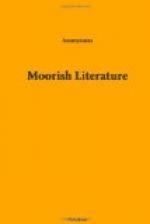[9] Reais
[10] Hanoteau, pp. 302, 303
The same sentiment inspires the Touareg songs, among which tribe women enjoy much greater liberty and possess a knowledge of letters greater than that of the men, and know more of that which we should call literature, if that word were not too ambitious:
“For God’s sake leave those
hearts in peace,
’Tis Tosdenni torments them so;
She is more graceful than a troop
Of antelopes separated from gazelles;
More beautiful than snowy flocks,
Which move toward the tents,
And with the evening shades appear
To share the nightly gathering;
More beautiful than the striped silks
Enwrapped so closely under the haiks,
More beautiful than the glossy ebon veil,
Enveloped in its paper white,
With which the young man decks himself,
And which sets off his dusky cheek."[1]
[1] Masqueray, Observations grammaticales sur la grammaire Touareg et textes de la Tourahog des Tailog, pp. 212, 213. Paris, 1897.
The poetic talent of the Touareg women, and the use they make of this gift—which they employ to celebrate or to rail at, with the accompaniment of their one-stringed violin, that which excites their admiration or inspires them with disdain—is a stimulant for warriors:
“That which spurs me to battle is
a word of scorn,
And the fear of the eternal malediction
Of God, and the circles of the young
Maidens with their violins.
Their disdain is for those men
Who care not for their own good names.[2]
“Noon has come, the meeting’s
sure.
Hearts of wind love not the battle;
As though they had no fear of the violins,
Which are on the knees of painted women—
Arab women, who were not fed on sheep’s
milk;
There is but camel’s milk in all
their land.
More than one other has preceded thee
and is widowed,
For that in Amded, long since,
My own heart was burned.
Since you were a young lad I suffered—
Since I wore the veil and wrapped
My head in the folds of the haik."[3]
[2] Masqueray, p. 220.
[3] Masqueray, p. 227.
War, and the struggle of faction against faction, of tribe against tribe, of confederation against confederation, it is which, with love, above all, has inspired the Berber men. With the Khabyles a string of love-songs is called “Alamato,” because this word occurs in the first couplet, always with a belligerent inspiration:
“He has seized his banner for the
fight
In honor of the Bey whose cause he maintains,
He guides the warriors with their gorgeous
cloaks,
With their spurs unto their boots well
fastened,
All that was hostile they destroyed with
violence;
And brought the insurgents to reason.”
This couplet is followed by a second, where allusion is made to the snow which interrupts communication:




